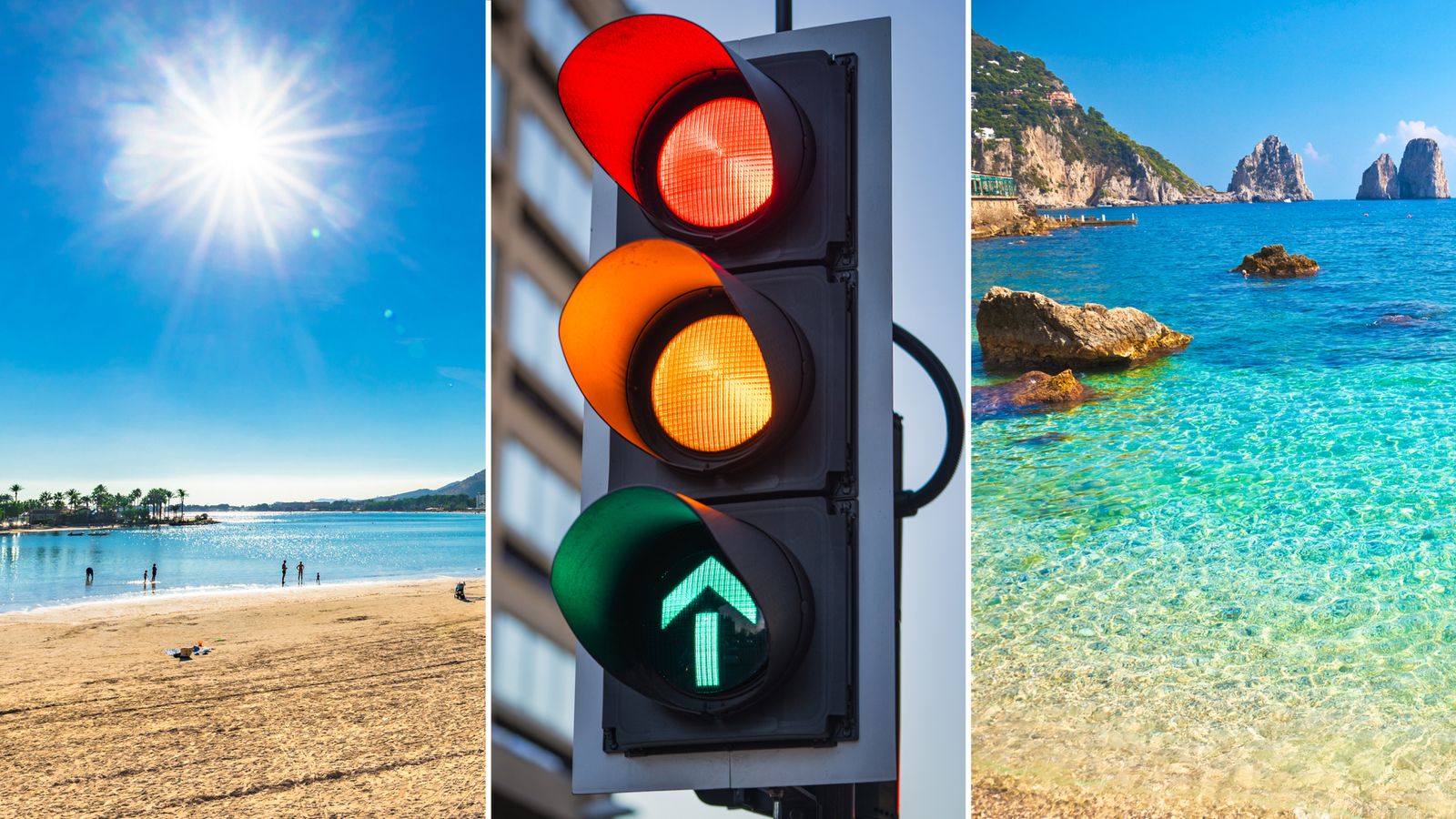Grant Shapps has insisted the government is trying to make foreign travel as affordable as possible amid criticism that a testing requirement will drive up holiday costs.
The transport secretary also told Sky News that people could now think about booking a break abroad in a change from previous advice as the government unveiled plans for a traffic light system to categorise countries based on risk.
However, the requirement for travellers to be tested on departure and arrival has sparked industry warnings that foreign holidays this year would be “just something for the wealthy”.
Live COVID updates from across the UK and around the world
The government has also refused to confirm whether foreign holidays will be permitted from 17 May – and where Britons will be able to travel without self-isolating on their return.
Mr Shapps said: “In the green category we will try to make it as affordable as possible to travel but taking an abundance of caution as we go because we don’t want to thro away all the good work of these lockdowns and people coming forward for vaccines by picking up variants of concern or anything else.
“It’s a cautious move but at least it provides that framework for people.”
He added: “Costs are definitely a concern. It is one of the factors this year. We have to accept we are still going through a global pandemic.
“We do have to be cautious and I am afraid that does involve having to have some tests and the like.
“But, I am undertaking today to drive down the costs of those tests and looking at some innovative things we could do.
“For example, whether we can help provide the lateral flow tests people need to take before they depart the country they are in to return to the UK and also drive down the costs of the tests when they get home if it is in the green category.
“We are trying to make it as practical as possible.”
A report by the Global Travel Taskforce suggests that international travel could resume from 17 May “in an accessible and affordable way” – and passengers would no longer need to prove they have a valid reason to leave the UK.
But firmer details of what will be allowed under the new measures – and when – may only emerge in a few weeks.
The Department for Transport said: “It is too early to predict which countries will be on which list over the summer, and the government continues to consider a range of factors to inform the restrictions placed on them.
“We will set out by early May which countries will fall into which category, as well as confirming whether international travel can resume from 17 May.”
Relaxation of travel rules could be delayed if the government believes it will risk the success of the vaccine rollout – and will only resume if vaccines are reducing hospital admissions and deaths enough, infections are not at risk of overwhelming the NHS, and there is not a fundamental change in risks from variants of concern.
Under the traffic light system, assessments will be based on a range of factors, including the proportion of a country’s population which has been vaccinated, rates of infection, emerging new variants, and the country’s access to reliable scientific data and genomic sequencing.
Restrictions will be “formally reviewed” on 28 June to take account of “the domestic and international health picture and to see whether current measures could be rolled back”, the department added.
Further reviews will take place no later than 31 July and 1 October.
Tim Alderslade, the chief executive of Airlines UK, said the framework “does not represent a reopening of travel as promised by ministers”.
He added: “The insistence on expensive and unnecessary PCR testing rather than rapid testing – even for low-risk countries – will pose an unsustainable burden on passengers, making travel unviable and unaffordable for many people.”
Please use Chrome browser for a more accessible video player
Karen Dee, the head of the Airport Operators Association, said the announcement “offers only a glimmer of hope to an industry battered by more than a year of near-complete shutdown”.
She said: “Transparent criteria for countries in each travel tier and an indicative green list along with a firm commitment to reopening on 17 May would boost consumer confidence and we urge the government to publish these shortly.”
EasyJet chief executive Johan Lundgren said the plan was “a blow to all travellers” and risked “making flying only for the wealthy”.
He added: “As the rest of British society and the economy opens up, it makes no sense to treat travel, particularly to low-risk countries, differently.”
Mark Tanzer, boss of travel trade organisation Abta, said permitting the use of lateral flow tests would “make international travel more accessible and affordable whilst still providing an effective mitigation against reimportation of the virus”.
It has also been revealed the Civil Aviation Authority will be given additional enforcement powers to act on airlines that breach consumer rights, after many passengers struggled to obtain refunds when flights were grounded.






















